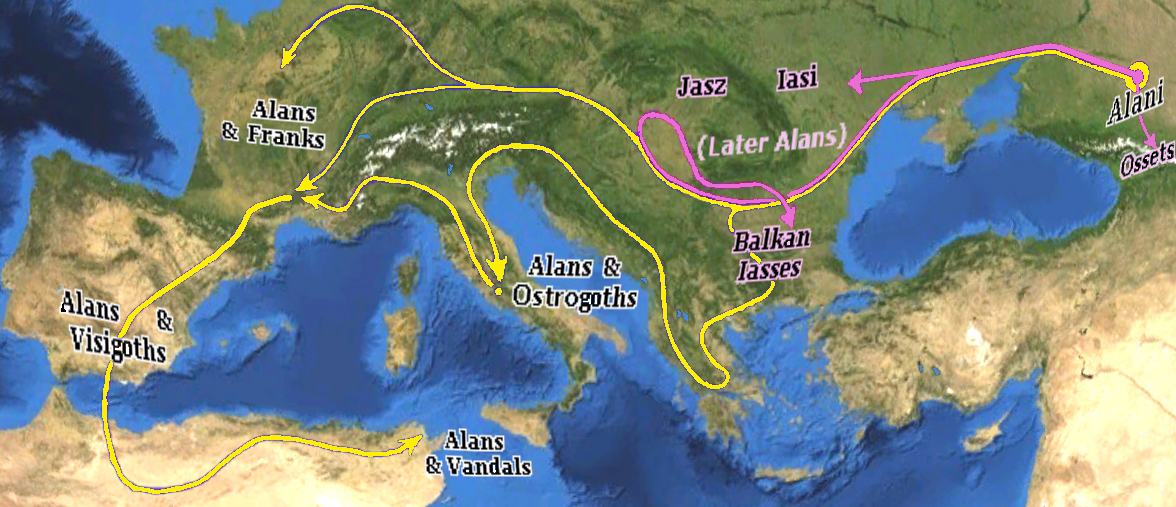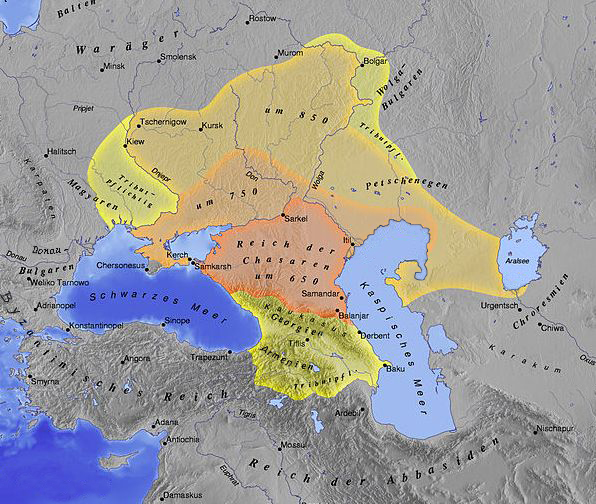|
Rededya
Rededey, Rededya or Ridada (; died 1022) was a prince of Kassogia, a Circassian tribe from the North Caucasus. History The Laurentian Codex provides the following information. In 1022, Prince Mstislav the Brave, who at the time was the prince of Tmutarakan, started a military operation against the Alans. During the operation, he encountered the Kassogian army commanded by Rededya. To avoid unnecessary bloodshed, Mstislav and Rededya, who possessed an extraordinary physical strengh, decided to have a personal fight, with the condition that the winner would be considered the winner of the battle. The fight lasted some hours and, eventually, Rededya was knocked to the ground and stabbed with a knife. The subjects of Rededya were forced to admit defeat. Mstislav ascribed his win to the Virgin, whom he prayed to before the battle. Subsequently, Mstislav has taken the wife and the two sons of Rededya and had them baptized. In their baptism, Rededya's sons got the names of Yury an ... [...More Info...] [...Related Items...] OR: [Wikipedia] [Google] [Baidu] |
Hapach
Hapach () was a king of Circassia (Zichia) in the 900s.Zenkovsky, Sergei A. ''Medieval Russia’s Cronicles, 58-59''D, S. ''Çerkes Krallar, Hükümdarlar'' "The leader of the Circassian tribes, Hapach, with his army of horsemen and allied principalities, attacked Sarkel, a city of the Khazars. The Khazar army was defeated and the Sarkel prince and his surviving army were shackled by their feet and imprisoned." Not much is known about Hapach's life or much of his reign. Reign Life and reign Not much is known about Hapach's life or much of his reign, only that he, with his army of horsemen and allied principalities, attacked Sarkel, a city of the Khazars, in the 900s. The Khazar army was defeated and the Sarkel prince and his surviving army were imprisoned. Borders The exact borders of the kingdom during his reign is also unknown. In historical sources, the area first appears in the 6th century, when the Byzantine historian Procopius of Caesarea''Wars'', VIII.4.2 records th ... [...More Info...] [...Related Items...] OR: [Wikipedia] [Google] [Baidu] |
Champion Warfare
Champion warfare refers to a type of battle, most commonly found in the epic poetry and myth of ancient history, in which the outcome of the conflict is determined by single combat, an individual duel between the best soldiers ("champions") from each opposing army. Champion warfare can also refer to a battle in which armies actually engage, but champions within the armies fight so effectively as to single-handedly carry the sway of battle, such as in the ''Iliad''. Champion warfare in literature * Numerous instances of champion warfare can be observed in Homer's ''Iliad'', most notably the climactic battle between Achilles and Hector, although there are many more. * Champion warfare has numerous examples in Ferdowsi's ''Shahnameh'' (Book of Kings). * Champion warfare is a common theme in the early books of Livy's history of Rome ''Ab Urbe Condita'' (''From the Founding of the City''), including the story of the famous triplets of the Horatii and Curiatii families and the gr ... [...More Info...] [...Related Items...] OR: [Wikipedia] [Google] [Baidu] |
Mstislav Of Chernigov
Mstislav Vladimirovich (; ; ) was the earliest attested prince of Tmutarakan and Chernigov in Kievan Rus'. He was a younger son of Vladimir the Great, Grand Prince of Kiev. His father appointed him to rule Tmutarakan, an important fortress by the Strait of Kerch, in or after 988. He invaded the core territories of Kievan Rus', which were ruled by his brother, Yaroslav the Wise, in 1024. Although Mstislav could not take Kiev, he forced the East Slavic tribes dwelling to the east of the Dniester River to accept his suzerainty. Yaroslav the Wise also accepted the division of Kievan Rus' along the river after Mstislav had defeated him in a battle fought at Listven by Chernigov (presents-day Chernihiv, Ukraine). Mstislav transferred his seat to the latter town, and became the first ruler of the principality emerging around it. Early years Mstislav was one of the many sons of Vladimir the Great, Grand Prince of Kiev. His exact position in Vladimir's family is disputed, beca ... [...More Info...] [...Related Items...] OR: [Wikipedia] [Google] [Baidu] |
Khabzeism
Circassian paganism, also called Khabzeism or Khabzism, is the ethnic religion of the Circassian people. It is based on worshipping the one major god, "Thashxwe" (or just "Tha"), and other minor deities under his rule, to each of whom is attributed an element, action or item of veneration and control. The religion also strongly focuses on the perfection of the soul, developing spiritual maturity and honour until a practitioner may enter the heavens, in union with their ancestors. Concepts and values The prominent concepts of Khabzeism include honour (''nape''), manifestation of compassion (''guschlegu''), gratuitous help (''psape''), which, along with valour, and the bravery of a warrior, enable the human soul to join the soul of the ancestors with a clear conscience (''nape huzhkle''). Thereby, the goal of man's earthly existence is the perfection of the soul; the souls of the ancestors also require commemoration, for they ability to observe and evaluate the affairs of their de ... [...More Info...] [...Related Items...] OR: [Wikipedia] [Google] [Baidu] |
Circassians
The Circassians (also referred to as Cherkess or Adyghe; Adyghe and Kabardian: Адыгэхэр, romanized: ''Adıgəxər'') are an indigenous Northwest Caucasian ethnic group and nation native to the historical country-region of Circassia in the North Caucasus. As a consequence of the Circassian genocide, which was perpetrated by the Russian Empire in the 19th century during the Russo-Circassian War, most Circassians were exiled from their homeland in Circassia to modern-day Turkey and the rest of the Middle East, where the majority of them are concentrated today. The Unrepresented Nations and Peoples Organization estimated in the early 1990s that there are as many as 3.7 million Circassians in diaspora in over 50 countries. The Circassian language is the ancestral language of the Circassian people, and Islam has been the dominant religion among them since the 17th century. Circassia has been subject to repeated invasions since ancient times; its isolated terrain co ... [...More Info...] [...Related Items...] OR: [Wikipedia] [Google] [Baidu] |
North Caucasus
The North Caucasus, ( ady, Темыр Къафкъас, Temır Qafqas; kbd, Ишхъэрэ Къаукъаз, İṩxhərə Qauqaz; ce, Къилбаседа Кавказ, Q̇ilbaseda Kavkaz; , os, Цӕгат Кавказ, Cægat Kavkaz, inh, Даькъасте, Däq̇aste, krc, Шимал Кавказ, Şimal Kavkaz, russian: Северный Кавказ, r=Severnyy Kavkaz, p=ˈsʲevʲɪrnɨj kɐfˈkas) or Ciscaucasia (russian: Предкавказье, Predkavkazye), is a subregion of Eastern Europe in the Eurasian continent. It is the northern part of the wider Caucasus region, and is entirely a part of Russia, sandwiched between the Sea of Azov and Black Sea to the west, and the Caspian Sea to the east. The region shares land borders with Georgia and Azerbaijan to the south. Krasnodar is the largest city within the North Caucasus. Politically, the North Caucasus is made up of Russian republics and krais. It lies north of the Main Caucasian Range, which separates it ... [...More Info...] [...Related Items...] OR: [Wikipedia] [Google] [Baidu] |
Mstislav And Rededia
Mstislav may refer to: * Mstislav (given name), a Slavic origin given name * Mstislav Rostropovich, a Russian cellist * Mistislaw (Obotrite prince), a leader of the Obotrite Slavs in the region of modern Mecklenburg and Holstein in northern Germany * an alternate spelling of Mstsislaw Mstislaw or Mstislavl ( be, Мсціслаў, [], russian: Мстиславль [msʲtʲɪˈslavlʲ], pl, Mścisław, lt, Mstislavlis) is a town in the Mogilev Region, Eastern Belarus. It serves as the administrative center of Mstsislaw District ..., a town in Mahilyow Voblast, eastern Belarus {{disambiguation pl:Mścisław ... [...More Info...] [...Related Items...] OR: [Wikipedia] [Google] [Baidu] |
Laurentian Codex
Laurentian Codex or Laurentian Letopis (russian: Лаврентьевский список, Лаврентьевская летопись) is a collection of chronicles that includes the oldest extant version of the '' Primary Chronicle'' and its continuations, mostly relating the events in Northern Russia (Vladimir-Suzdal). The scribe and his source The codex was not just copied by the Nizhegorod monk Laurentius commissioned by Dionysius of Suzdal in 1377. The original text on events from 1284 to 1305 was a lost codex compiled for the Grand Duke Mikhail of Tver in 1305, but Laurentius re-edited the presentation of Yuri Vsevolodovich, the founder of Nizhny Novgorod, from positive into a negative, partly rehabilitating the role of Tatars. Vasily Komarovich studied traces of changes within the manuscript and established a hypothesis about differences between Laurentius' version and the lost one of the Tver chronicle. Content The Laurentian Codex compiled several codices of t ... [...More Info...] [...Related Items...] OR: [Wikipedia] [Google] [Baidu] |
Alans
The Alans (Latin: ''Alani'') were an ancient and medieval Iranian nomadic pastoral people of the North Caucasus – generally regarded as part of the Sarmatians, and possibly related to the Massagetae. Modern historians have connected the Alans with the Central Asian Yancai of Chinese sources and with the Aorsi of Roman sources. Having migrated westwards and becoming dominant among the Sarmatians on the Pontic–Caspian steppe, the Alans are mentioned by Roman sources in the . At that time they had settled the region north of the Black Sea and frequently raided the Parthian Empire and the Caucasian provinces of the Roman Empire. From the Goths broke their power on the Pontic Steppe. Upon the Hunnic defeat of the Goths on the Pontic Steppe around , many of the Alans migrated westwards along with various Germanic tribes. They crossed the Rhine in 406CE along with the Vandals and Suebi, settling in Orléans and Valence. Around 409 CE they joined the Vandals and S ... [...More Info...] [...Related Items...] OR: [Wikipedia] [Google] [Baidu] |
Duel
A duel is an arranged engagement in combat between two people, with matched weapons, in accordance with agreed-upon Code duello, rules. During the 17th and 18th centuries (and earlier), duels were mostly single combats fought with swords (the rapier and later the small sword), but beginning in the late 18th century in England, duels were more commonly fought using pistols. Fencing and shooting continued to co-exist throughout the 19th century. The duel was based on a Code of conduct, code of honor. Duels were fought not so much to kill the opponent as to gain "satisfaction", that is, to restore one's honor by demonstrating a willingness to risk one's life for it, and as such the tradition of dueling was originally reserved for the male members of nobility; however, in the modern era, it extended to those of the upper classes generally. On occasion, duels with swords or pistols were fought between women. Legislation against dueling goes back to the medieval period. The Fourth Co ... [...More Info...] [...Related Items...] OR: [Wikipedia] [Google] [Baidu] |
Tmutarakan
Tmutarakan ( rus, Тмутарака́нь, p=tmʊtərɐˈkanʲ, ; uk, Тмуторокань, Tmutorokan) was a medieval Kievan Rus' principality and trading town that controlled the Cimmerian Bosporus, the passage from the Black Sea to the Sea of Azov, between the late 10th and 11th centuries. Its site was the ancient Greek colony of Hermonassa ( grc, Ἑρμώνασσα) founded in the mid 6th century BCE, by Mytilene (Lesbos), situated on the Taman peninsula, in the present-day Krasnodar Krai of Russia, roughly opposite Kerch. The Khazar fortress of Tamantarkhan (from which the Byzantine name for the city, Tamatarcha, is derived) was built on the site in the 7th century, and became known as Tmutarakan when it came under Kievan Rus control. History The Greek colony of Hermonassa was located a few miles west of Phanagoria and Panticapaeum, major trade centers for what was to become the Bosporan Kingdom. The city was founded in the mid-6th century BCE by Mytilene (Lesb ... [...More Info...] [...Related Items...] OR: [Wikipedia] [Google] [Baidu] |

.jpg)




